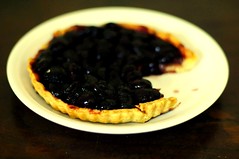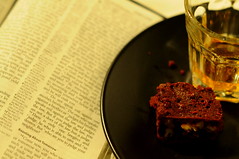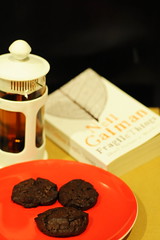Childhood fantasies are funny things, and in their own way, naive and selfishly insular.
For children barred from eating any sort of red meat, fascination with the smell and texture of the cooked flesh of dead cows.
For children for whom sugar (refined, or of the fresh cherry or strawberry sucrose variety) could only be obtained by sneaking sugar packets from restaurants and eating the white stuff surreptitiously in a corner hidden by piles of yellow National Geographic magazines, dreams of the desserts and edible delights that were the bricks and motar of the witch's house in Hansel und Gretel.

The seemingly grander fantasies of grown men.
"Now, there are some who question the scale of our ambitions...," said Obama because if nothing he is skilled enough to anticipate and address audience response,"their memories are short. For they have forgotten what this country has already done..." The basis of his confidence in the vision of Americans working together for a common purpose is their glorious history and their forefathers who "struggled and sacrificed and worked till their hands were raw so that we might live a better life. [Who] saw America as bigger than the sum of our individual ambitions; greater than all the differences of birth or wealth or faction" and of whose legacy they were keepers.
(Arguably however, the past does not necessarily inform the future, especially for neo-nazis and regulars at KKK meetings who would see no reason to perpetuate the "mistakes" of America's history. Though citizens of the land, they will have no part in any "common purpose".)
"My brothers!" James calls out (James 2:1) in a tone of familiarity not unlike that invoked by the 44th POTUS. But James is claiming more than a common humanity or a common citizenship. For on those bases, we give to charity and help little old ladies cross roads. But not all of us all of the time. Because sin has entered into the world, sometimes monies are spent on frivolous luxuries and little old ladies are honked at and knocked down.
And the scale of James' stated ambition, the vision of a church not split by partiality or discrimination, is not based on the great and glorious history of Israel, heavily varnished by sweeping rhetoric. Scripture is more realistic than that. It recognises the innate sinfulness of men and women everywhere of all races and positions and creeds. There can be no multi-racial un-class-conscious society in any deep meaningful way except in the real brotherhood that is united by faith in the blood of our Lord Jesus Christ (James 2:1).

But in a manner not too popular with modern Americans, Jesus and later Paul failed to encourage us to consider ourselves equal in all respects with everyone else. They emphasised the need to give due honour where such honour was due: to the governing authorities instituted by God, even though they might not have been Christian, slaves were to obey their masters, respect was to be given to those senior in years. Age and authority merit from us a reasonable and courteous respect. We are not told to respect nothing.
Furthermore, even the most outwardly egalitarian of humans will make judgements on peoples and situations as part of daily life. And without the guiding hand of the Bible, we inevitably respect the wrong things. Judging people by the magnitude of their wealth in particular is a common folly in democratic capitalist societies. To treat wealth as meaningless is intellectual imbecility - the markets have evolved so that it is money that pays for food, shelter, nealthcare, transportation, and arguably, civilisation. The patently non-materialists too cannot avoid the inadvertent snobbery of giving uncalled-for preferential treatment to the allegedly disadvantaged, like the black politican who was interviewed as saying that the antidote to a corrupt senator who happened to be white was to put a black man in that office. The favouritism of the coloured skin.
And again, netizens often enjoy seeing the rich get punished both for their crimes as well as for their wealth in courts of law. But the Bible has always been refreshingly clear in stating that there be no discrimination in judgement - no partiality to the poor, nor deference to the great (Leviticus 19:15, Deuteronomy 1:17).
It is inevitable that if we do not take the Bible as truth, then we take on the standards of the world as truth. But if we profess to accept God's word and claim we have faith in him, then why how can we hear but not do (James 1:22-25)? How can we still play favourites within the church family (James 2:2-7)?
So we may not suck up to the politican during service with sycophantic motives towards his riches and influence and usefulness, but if we think that preaching in a savage reservation is greater than preaching to the owners of luxury yachts, or that the Chief of Defence Force volunteering as door-greeter is more humbled and thus more godly than the roadsweeper performing the same task, then perhaps we have subscribed to the half-truth that communism thrived on - the favouritism of farmers and dismissive and harsh treatment of the educated and well-off.
Obama's political vehicle of government through mutual love and respect has been well-received. God is love? Even those opposed to Christianity have no problem with this statement. But they do not understand that because God is the Creator, God alone defines what love is, not us. And it's not about warm waffles and fuzzy hugs. God's specs of this thing called love can be found in his laws and commandments. Only if we obey his laws and commandments can we be making some headway in loving others properly. Hence, the outcry from certain communities over what they perceive to be outdated "conservative" Christian distaste over their way of life, and the accusations of the unlovingness of these Christians are unfounded. The protestors do not truly understand what love is.
If we turn the spotlight on just one facet of God's love, what glimmers forth here is love as lack of favouritism (Romans 2:11). If we claim to show love to some people and not to others, then our actions cannot have come from true love, divine love. The all-encompassing law of loving neighbour is not a relaxation of the law of obedience of the 10 commandments because they were so darned hard to keep but an explanation of their depth and the consequent scope of human obligations. So the 10 commandments were in fact, only examples of what it meant to love one's neighbour. We cannot claim to have kept to the spirit of the law (by our own interpretation) if we did not even obey the explicit details of what it means to keep the law.
And if the royal law, the law of liberty, is a direct reflection of the character of God, then we cannot call some details important and others not (James 2:10-13). We cannot divide them into venial sins and mortal sins. This guards us against the deceitfulness and self-righteousness of taking refuge in our disobedience by stressing our obedience to other bits.
James does not merely administer a friendly slap on the wrist here. He puts out a dire warning: discriminate and die. For if you show partiality, you break the law of loving neighbour and sin and shall be convicted as transgressors (James 2:9). And the sentence for such law-breaking is death (James 1:15), because it demonstrates that despite your profession of allegiance to Christ, you worship the king of this world, not God; you are an enemy of state, of the kingdom that will triumph in the end.
We who are the firstfruits of God's creatures (James 1:18) have no excuse: we know God, we are not ignorant of his laws (because not only has God revealed to us his statutes time and again in the Bible, we also have the implanted word (James 1:21)) nor of the need to obey them, nor do we lack the ability to do what is required of us through the Spirit (Galatians 5:16-26).
James
Labels: *James, All Given For Food: Bake and Cake, All Given For Food: Cherries, All Given For Food: Dead Cows, All Given For Food: Rookie Cookery, All Given For Food: Strawberries


































